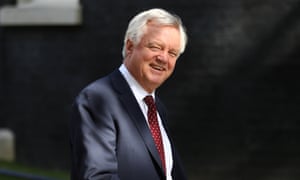David Davis has told Theresa May her “best of both worlds” plan for Brexit is unworkable, in a letter written as details emerged of the prime minister’s proposed new customs arrangement.
The Brexit secretary raised concerns that the “facilitated customs arrangement” compromise plan – which would allow the UK to set its own tariffs on goods arriving in the country – was too similar to a discarded idea that the EU had already rejected.
Downing Street indicated that under the plan tracking devices would e used to determine where the goods would ultimately end up, and therefore whether UK or EU tariffs should be paid.
Details of the plan are still emerging and it is not certain whether the cabinet will back it at a key Brexit meeting at Chequers on Friday. But the early hints were that it would be acceptable to other key Brexiters such as Boris Johnson and Michael Gove, paving the way for the publication of a strategy white paper next week.
The “third way” customs proposal is intended to end the cabinet clash between the “maximum facilitation” model favoured by Brexiters, which relies on using technology to ensure the correct tariffs are levied on goods crossing the UK border, and May’s once favoured “customs partnership”, which involves the UK collecting tariffs on behalf of the EU.
Davis’s concern is that the EU will block any deal for the UK to police its borders. The Daily Telegraph reported that in his letter he said the plan was doomed because it amounted to a customs partnership with some additional technological elements. The EU has previously rejected both the maximum facilitation and customs partnership models.
Downing Street says its plan could be in place by the end of the proposed transition period in December 2020.
May travelled to Berlin on Thursday afternoon to discuss the progress of Brexit negotiations with the German chancellor, Angela Merkel. The prime minister is under intense pressure from EU leaders and industry to provide greater clarity, but No 10 has said it will not detail new customs plans to Merkel before they are discussed in cabinet.
As she arrived for the bilateral meeting with Merkel, May said the UK was about to propose “a substantial way forward” which she claimed would “enable the pace and intensity of negotiations to increase”.
However, Merkel said time was running short to strike a Brexit deal and it was important for Britain and Germany to keep talking. “Negotiations will now enter a crucial phase. You know that on behalf of the European Union the commission is leading those negotiations with the United Kingdom,” she said. “So there are a number of issues that we would like to discuss here also bilaterally, a number of substantive issues.”
Before Friday’s away day, there is also ministerial concern that the focus on the details of future customs arrangements is too narrow. Remain-leaning cabinet ministers fear it leaves out the crucial services sector, while Brexiters are nervous that the meeting will fail to address freedom of movement.
Britain’s biggest vehicle manufacturer, Jaguar Land Rover, said it needed greater certainty to continue to invest heavily in the UK. “A bad Brexit deal would cost Jaguar Land Rover more than £1.2bn profit each year,” said its chief executive, Ralf Speth.
Two other major employers, BMW and Airbus, have said their positions in the UK would be in doubt if their production processes were threatened by the terms of the UK’s post-Brexit relationship with the EU.
